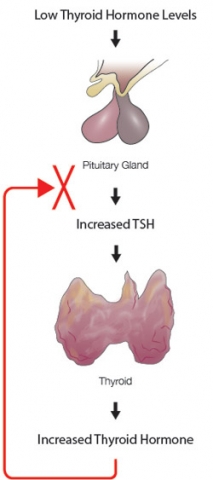Thyroid Glands
What Are The Thyroid Glands?
The thyroid gland is one of the body's most important endocrine organs and is located in the center of the neck just below the thyroid cartilage (Adam's apple). The thyroid looks like a butterfly with lobes on either side of the windpipe which are connected by a middle piece called the isthmus that sits right on top of the windpipe.
Each lobe of the thyroid is about the size of an orange slice. The thyroid is surrounded by a number of important structures like
- the carotid artery (the artery that brings blood to the brain),
- the internal jugular vein (the vein that brings blood from the brain to the heart),
- the esophagus (the first part of the digestive tract),
- the trachea (the windpipe),
- and the parathyroid glands (4 small glands the size of a grain of rice that control the blood calcium levels).
In addition, there are a number of nerves on both sides of the neck that control the voice (i.e. recurrent laryngeal nerve) and breathing (i.e. phrenic nerve) in the area.
Finally, there is a whole network of lymphatics and lymph nodes throughout the neck that help to filter blood and body fluid. These lymph nodes are divided into the central neck lymph nodes (right next to the thyroid) and the lateral neck lymph nodes (surrounding the carotid artery and jugular vein). These lymph nodes are the first place to which thyroid cancer will usually spread.
What Does the Thyroid Do?
The thyroid's main job is to control the body's metabolism (i.e. energy levels, temperature control, how fast the heart beats, how fast food moves through the GI tract, how fast sugar is made and used up in the body, bone loss, and other important bodily functions). The thyroid does this by making a hormone called thyroid hormone.
 The pituitary (i.e. a special part of the brain called the "master gland") makes a hormone called thyroid stimulating hormone (i.e. TSH) which stimulates the thyroid to make and release thyroid hormone. The thyroid then takes iodine from the diet and converts it into thyroid hormone which it will send into the bloodstream. The amount of thyroid hormone regulates the amount of TSH made by the pituitary (i.e. the thyroid hormone levels provide feedback to the brain to either increase or decrease TSH levels). When there is enough thyroid hormone in the body, the TSH level drops and thyroid hormone is stored in the thyroid like a warehouse. When there is not enough thyroid hormone in the body, the TSH level rises and thyroid hormone is released into the body. Problems of thyroid function can happen when there is too little or too much thyroid hormone in the body. See Hyperthyroidism and Hypothyroidism ».
The pituitary (i.e. a special part of the brain called the "master gland") makes a hormone called thyroid stimulating hormone (i.e. TSH) which stimulates the thyroid to make and release thyroid hormone. The thyroid then takes iodine from the diet and converts it into thyroid hormone which it will send into the bloodstream. The amount of thyroid hormone regulates the amount of TSH made by the pituitary (i.e. the thyroid hormone levels provide feedback to the brain to either increase or decrease TSH levels). When there is enough thyroid hormone in the body, the TSH level drops and thyroid hormone is stored in the thyroid like a warehouse. When there is not enough thyroid hormone in the body, the TSH level rises and thyroid hormone is released into the body. Problems of thyroid function can happen when there is too little or too much thyroid hormone in the body. See Hyperthyroidism and Hypothyroidism ».
What Kind of Problems Can Develop In the Thyroid?
Thyroid disorders are very common in the United States, with over 20 million people receiving treatment for one. An estimated two million others have an undiagnosed thyroid problem. In general, most thyroid diseases are 3 to 4 times more common in women than in men. Thyroid problems can be broken down into the following groups:
- Thyroid nodules (mass in the thyroid)
- Multinodular goiters (multiple nodules)
- Diseases of thyroid function (hyperthyroidism and hypothyroidism)
- Cancer
Next Steps
If you are dealing with a thyroid issue, our team at the Columbia Thyroid Center is here to help. Call (212) 305-0444 or request an appointment online.
Related Conditions
- Graves’ Disease
- Hyperthyroidism
- Hypothyroidism
- Multinodular Goiter
- Thyroiditis
- Thyroid Nodules
- Thyroid Cancer: Overview | Types | Causes | Symptoms | Diagnosis | Treatment | Prognosis/Outcomes
- Papillary Thyroid Cancer
- Follicular Thyroid Cancer/ Hurthle Cell Carcinoma
- Medullary Thyroid Cancer
- Anaplastic Thyroid Cancer
- Thyroid Lymphoma
Related Tests & Treatments
This content has been created by Columbia’s Health Guide Team. Learn more about our efforts to bring you the clearest, most accurate, and most human health resources available.
